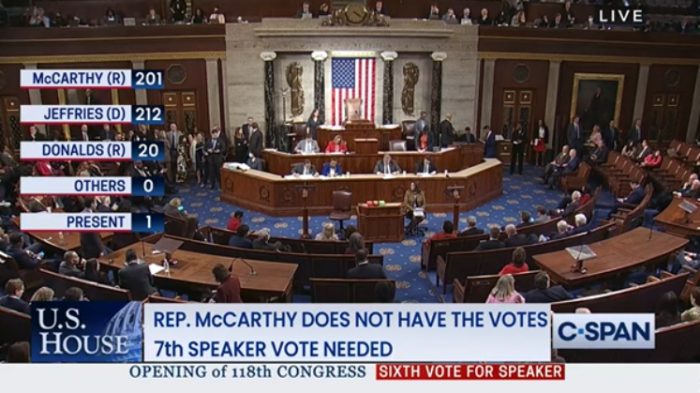 For the past three days Republicans in the US House of Representatives have failed to elect a new Speaker of the House – and without which the chamber is unable to legislate. Phelan US Centre Director, Professor Peter Trubowitz looks at why Republicans have not been to agree to support California Republican, Kevin McCarthy’s bid for the speakership and what this may mean for the party, and for important aspects of US governance in the coming year.
For the past three days Republicans in the US House of Representatives have failed to elect a new Speaker of the House – and without which the chamber is unable to legislate. Phelan US Centre Director, Professor Peter Trubowitz looks at why Republicans have not been to agree to support California Republican, Kevin McCarthy’s bid for the speakership and what this may mean for the party, and for important aspects of US governance in the coming year.
Where do things stand for McCarthy’s Speakership bid?
Kevin McCarthy (R-CA) is on political life support. Having been rebuffed by a small minority in his own party, his only real chance at this point is if he can peel off a handful of the 20 Republicans who oppose his bid to be Speaker of the US House of Representatives and get some Republicans who back him to vote present rather than casting a vote for or against his Speakership. Given the House’s arcane voting rules, that would allow McCarthy to squeak by with just enough votes to secure a majority. It’s basically boiled down to a numbers game and it’s not clear that he can clear the bar. That’s where we are today.
What happens if McCarthy can’t secure a majority today?
If Kevin McCarthy is unable to get some movement in his direction soon, his supporters will likely begin trying to rally around another candidate, possibly the next in line on the Republican side, Steve Scalise from Louisiana, or Jim Jordan of Ohio. Some like Ken Buck from Colorado are already threatening to do so. (There is also an outside chance that Republicans and a handful of Democrats rally around some dark horse candidate, but I wouldn’t hold my breath.) So, it’s not only a question of how much humiliation Kevin McCarthy can endure; it’s also a question of how much of spectacle rank and file Republicans can stomach.

What does all this mean for the Republicans and US governance?
Well, the first thing to say is that for Republicans it underscores the real problem they have: they aren’t popular right now. The reason that Kevin McCarthy and his core supporters in the House are in this fix is that they and their party underperformed in the midterms and now have virtually no room for error when it comes to votes in the lower chamber.
One key takeaway is that it won’t matter who the Republicans elect as a Speaker. They are going to be working with thin margins and that means that only a small handful of Republicans will be able to tie the party up into knots. The real danger here is that a few Republican intransigents could also tie the country up into knots over something with real consequences like increasing the debt limit to prevent the US from defaulting or passing the Farm Bill, which has to be renegotiated this year, that nearly 40 million Americans depend on in one way or another.
- This article is based on a 5 January interview with Professor Trubowitz on Bloomberg Surveillance: Early Edition.
Please read our comments policy before commenting
Note: This article gives the views of the author, and not the position of USAPP– American Politics and Policy, nor of the London School of Economics.
Shortened URL for this post: https://bit.ly/3WOOIzY






